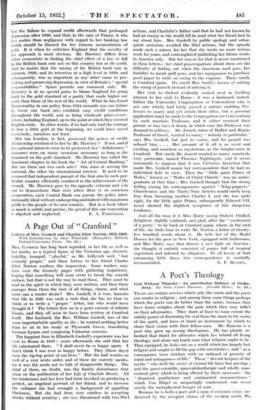A Page Out of " Cranford " MRS. GASKELL has
long been regarded, in her life as well as her works, as a typical figure of the Victorian age, discreet, ladylike, tranquil, " playful," as Mr. Lilly wick said, " but sewerely proper," and these letters to her friend Charles Eliot Norton confirm the impression. Some readers may turn over the leisurely pages with gathering impatience, hoping that something will soon occur to break the smooth surface, but that is not the way to read them. They must be read in the spirit in which they were written, and then there emergeS from them the best of all things, charm, and what more can a reader desire? Mrs. Gaskell, it is true, laments that life in 1861 was such a rush that she has no time to think or to write a " proper " letter, but who would have thought it ? The letters flow on in a quiet current of infinite leisure, and theY all"Seeiri to have been written at Cranford itself. Her husband, the Rev. William Gaskell, was of the same imperturbable quality as she : he wanted nothing better than to sit in his study at Plymouth Grove, translating German hymns and composing Unitarian sermons.
The happiest time in Elizabeth Gaskell's experience was her visit to Rome in 1857: years afterwards she said that her life culminated there. " I shall never be so happy again. .1 don't think I was ever so happy before. They (those days) Were the tip-top point of our lives." But she had worries as well of a very acute order, and of these she scarcely speaks, for it was the mode not to talk of disagreeable things. The chief of them, no doubt, was the frantic disturbance that arose on the publication of her Life of Charlotte Bronte. All her tenderness and her love had been lavished on producing a perfect, an 'angelical portrait of her friend, and to increase the radiance she had wrought a background of appalling blackness - But she had been very careless in accepting stories without scrutiny ; she 'was threatened with two libel
actions, and Charlotte's father said that he had not known he had an enemy in the world till he read what her friend had to say about him. Mrs. Gaskell by public apology and subse- quent omissions avoided the libel actions, but the episode Made such a misery for her that she wrote no more serious work for years, and contemplated publishing her future works in America only. But her reason for that is never mentioned in these letters : her chief preoccupations about them are the difficulty of finding out when the American mail goes. her inability to mend quill pens, and her repugnance to purchase good paper to write on owing to the expense. There surely is Cranford again. We recall Miss Smith's horror of cutting the string of parcels instead of untying it.
Her visit to Oxford evidently ranked next in thrilling interest to her visit to Rome : it was a landmark indeed. Either the UniverSity Congregation or Convocation (she is not sure which) had lately passed a statute enabling Pro- fessors to marry and yet retain their office, but a personal application must be made to the Congregation (or Convocation) by each uxorious Professor, and it either received their permit or was turned doivn, in which case the Professor was doomed to celibacy. Mr. Jowett, tutor of Balliol and Regius Professor of Greek, wanted to marry " nobody in particular," says Mrs. Gaskell, but just to marry, and his permit was refused him. . . . Her account of it all is as vivid and exciting, and somehow as mysterious, as the burglar-scare in Cranford. But surely Mr. Jowett wanted to marry somebody very particular, named Florence Nightingale, and it seems reasonable to suppose that it was Victorian discretion that made Mrs. Gaskell assure her correspondent that he had no individual lady in view. Then the " little quiet Prince of Wales," known as " Wales of Christ Church," was an under- graduate at that time : Mrs. Gaikell thought that the strong feeling among his contemporaries against " King-puppets," Church-rates and the Thirty-Nine Articles would surely keep him from becoming another Charles I, and she was quitii right, for the little quiet Prince, subsequently Edward VII, never showed the slightest symptoms of this dangerous tendency.
And all the time it is Miss Matty seeing Oxford, thrilled; delighted, slightly confused, and glad, after the " excitement Of a party," to be back at Cranford again, where, in the rush of life, she finds time to write Mr. Norton a letter of twenty- five hundred words about it. He tells her of the Model Houses for the poor in New York, equipped with bathrooms, and Miss Matty says that throws a new light on America : she thought it entirely consisted of gorges full of tropical vegetation and infested by alligators. To all lovers of that entrancing little dame this correspondence is cordially


























































 Previous page
Previous page